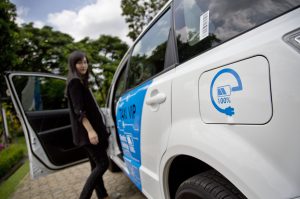In 2023, and to much fanfare, Tesla opened its first showroom in Malaysia and began taking orders for the Model Y, which retails for 199,000 to 288,000 Malaysian ringgit (between $42,800 and $62,000). The government announced it would have a nation-wide network of 10,000 EV charging stations operational by 2025, while Prime Minister Anwar Ibrahim hailed the EV-maker’s entry as an important step in Malaysia’s quest to be a regional high-tech hub.
Several press reports claimed Tesla’s arrival in Malaysia signaled a triumph over regional peers, especially neighboring Indonesia, which has been courting Elon Musk and Tesla for years but has been unable to close a deal.
Global demand for electric vehicles (EVs) is accelerating rapidly and countries around the world, including Southeast Asia, are racing to become part of the EV boom. They are doing this through demand-side incentives like rebates and subsidies designed to expand the market for EVs and increase purchases. But many emerging and middle-income countries, like Malaysia, do not want to simply be a market for EVs. They want to make them, or at least be integrated into global EV supply chains in some fashion. Countries across Southeast Asia are adopting different strategies for achieving this goal.
Making sense of the increasingly competitive EV landscape in the region requires first drawing a line between the markets and the makers.
Singapore is the quintessential market for electric vehicle sales in the region.
Malaysia is also, primarily, a market for EVs. This is why framing Tesla’s entry into the Malaysian market as a victory only tells part of the story. Malaysia would like to be an EV maker, but for now it’s mainly a market and a parts supplier.
Thailand and Indonesia are the leading automobile makers in Southeast Asia. They produce parts as well as fully assembled vehicles for both domestic consumption and export, and are integrated into the supply chains of major international brands. This makes them the most likely candidates to become regional production hubs for electric vehicles.































